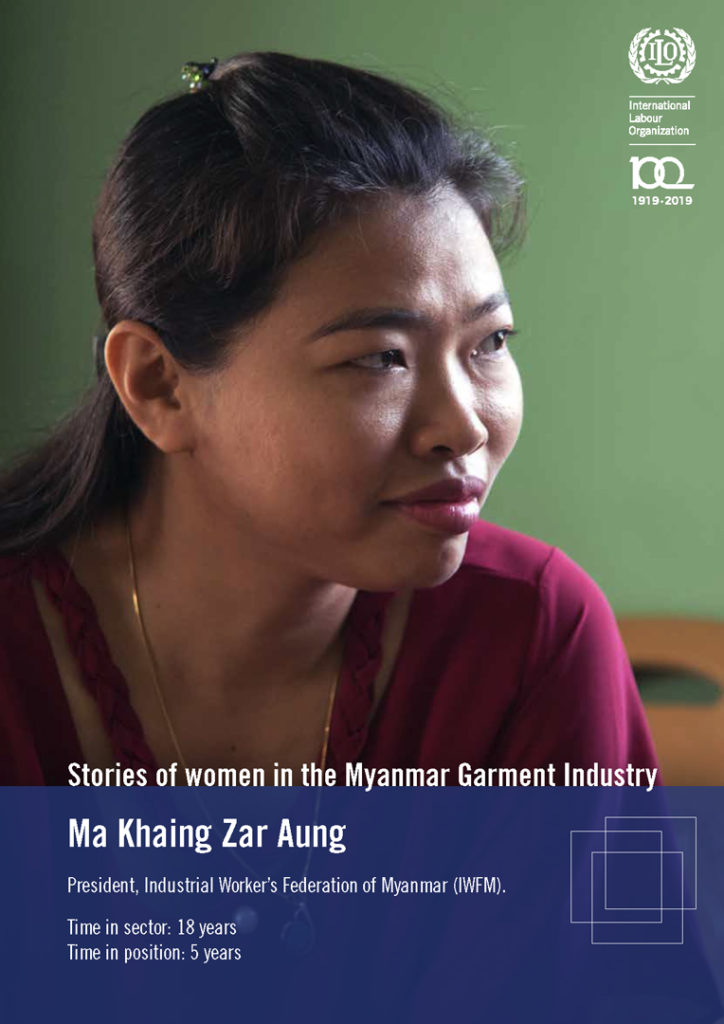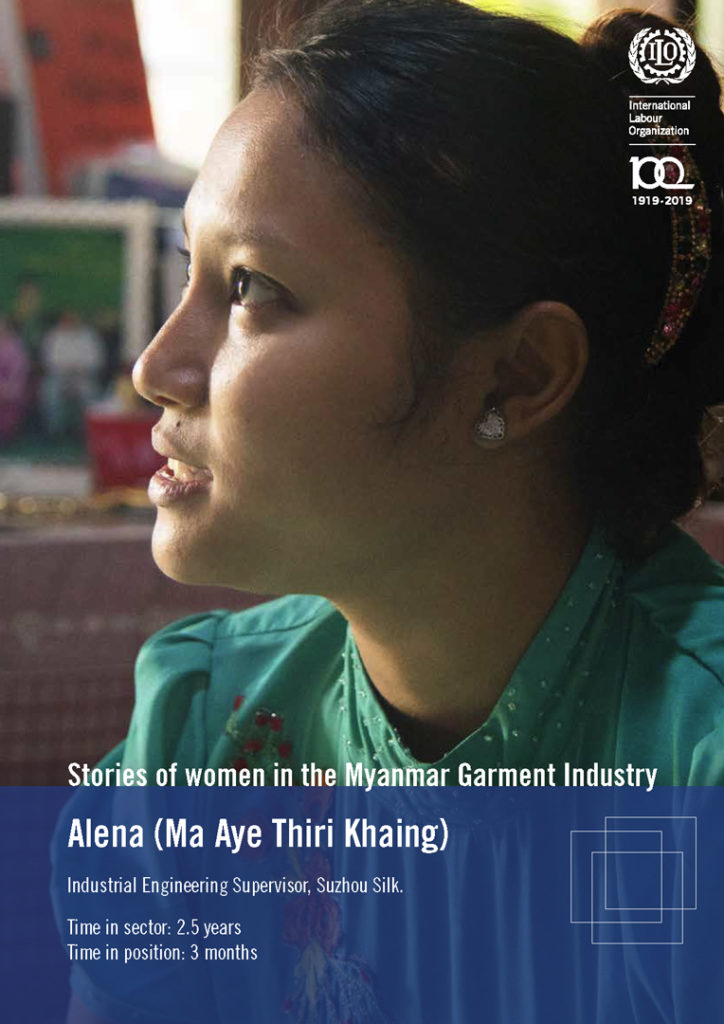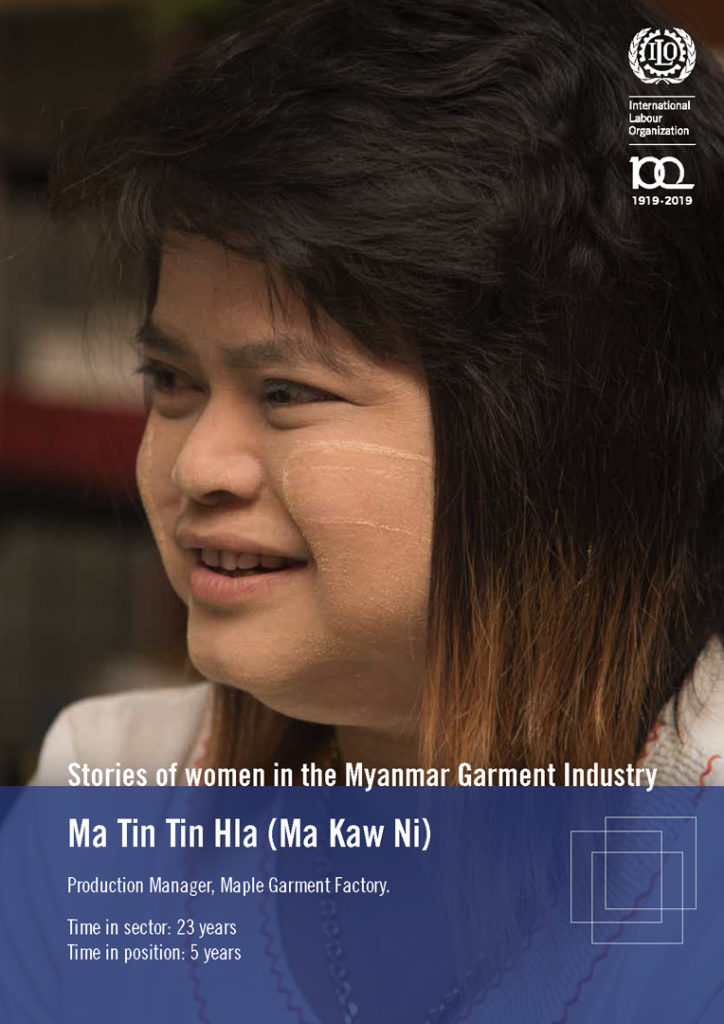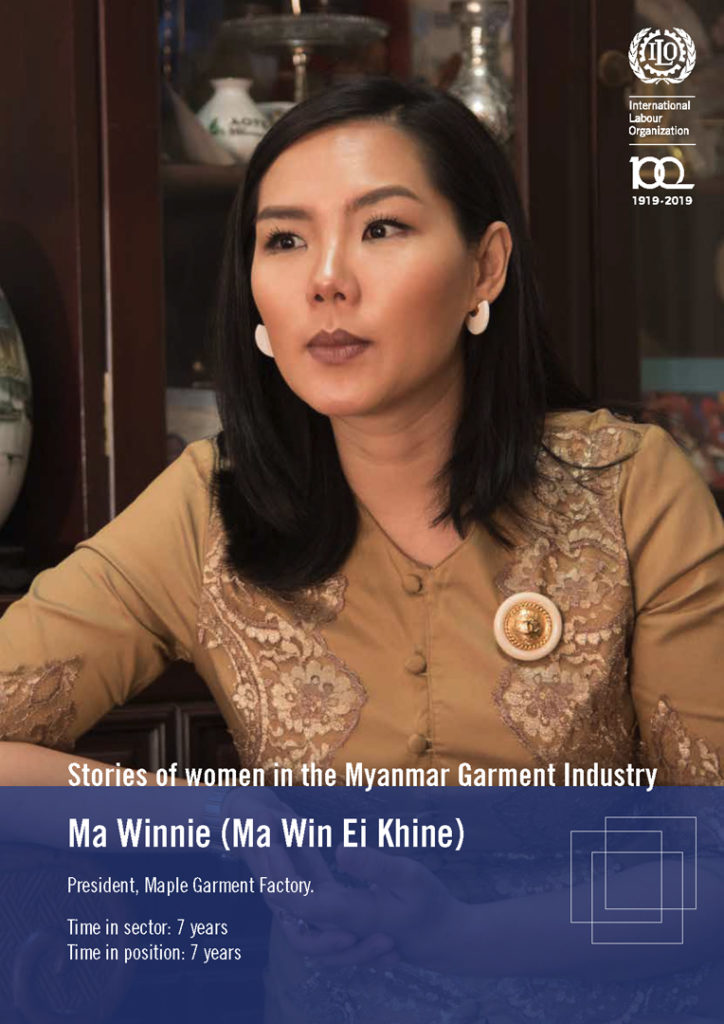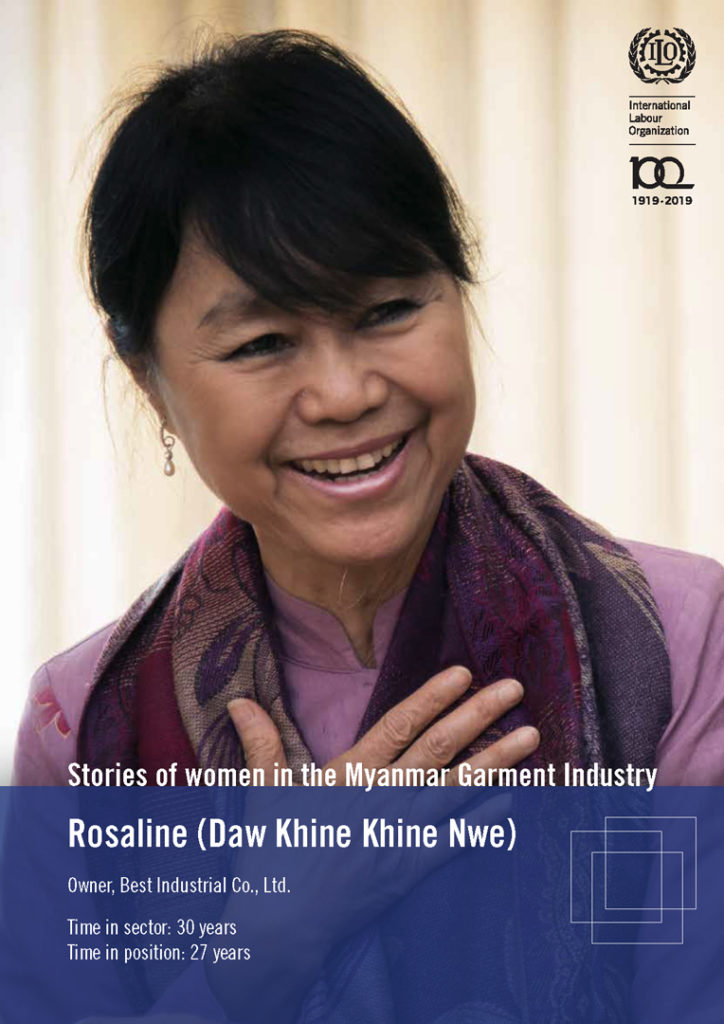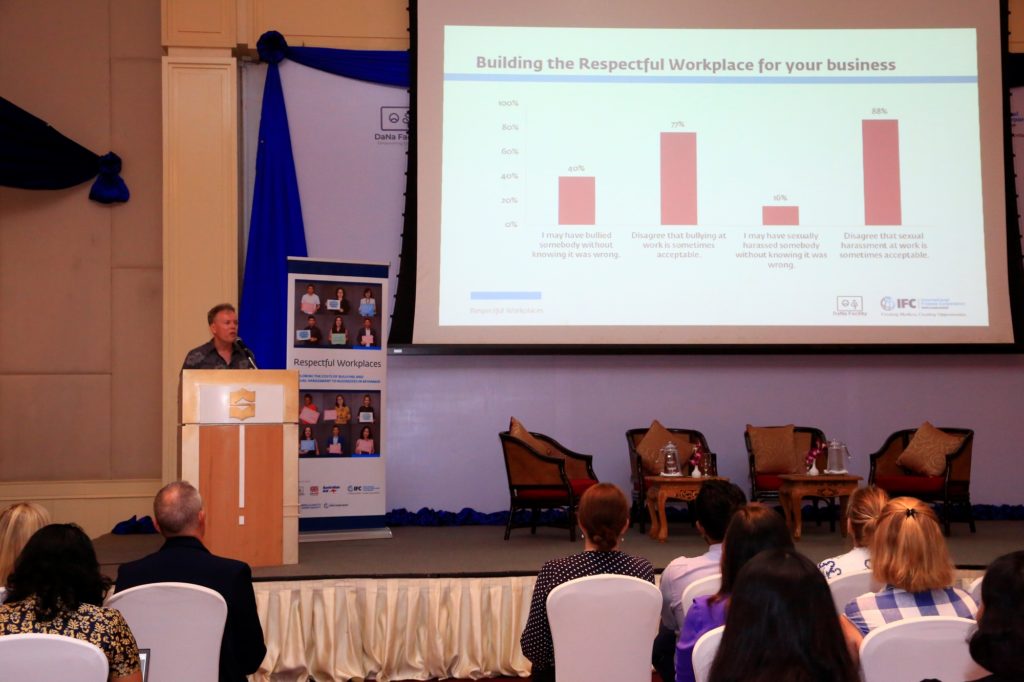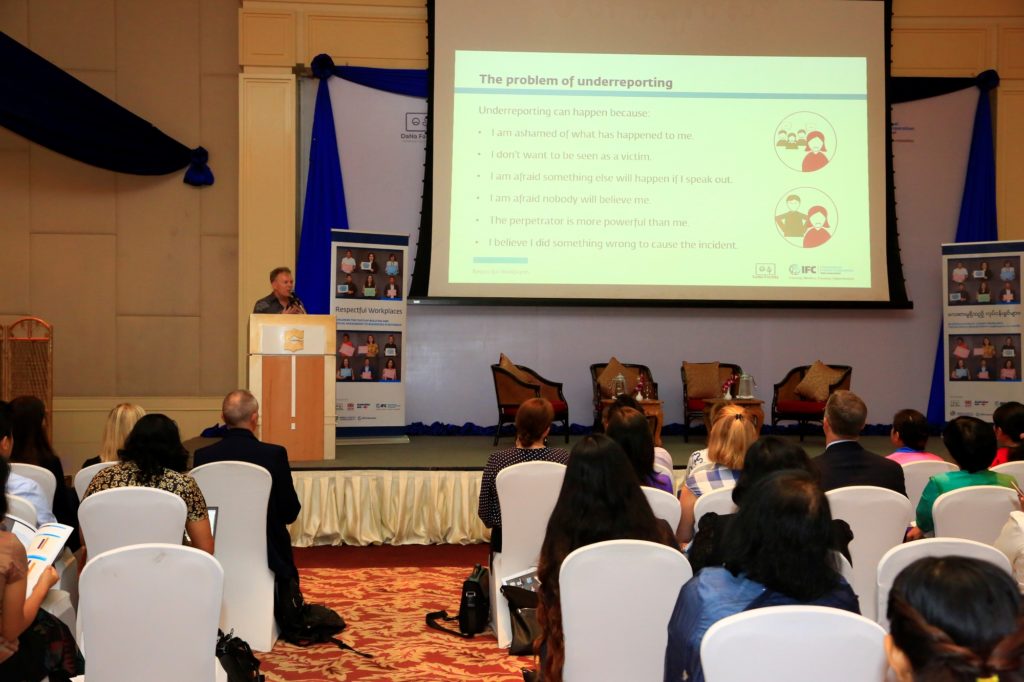Category: Factive
Launch of IFC research project on employer-supported childcare in PNG
Factive is pleased be involved in a new research project for the International Finance Corporation (IFC) in Papua New Guinea (PNG), in collaboration with the Business Coalition for Women (BCFW) based in Port Moresby. This new research project involves engaging with almost 30 private sector companies to better understand the childcare needs of working parents in PNG, and to identify the costs and opportunities of employer-supported childcare.
Access to high-quality, affordable childcare is severely limited in many developing countries and this is also the case for working parents in PNG. This is due in part to a lack of government support for childcare services, as well as a lack of private sector investment in the sector. As a result, many working parents in these countries rely on informal childcare arrangements, such as leaving their children with relatives or neighbors, or perhaps leaving them at home unsupervised.
Previous research into employer-supported childcare in other countries has highlighted the economic benefits of investing in childcare services. Studies have shown that access to affordable, high-quality childcare can have a positive impact on women’s labor force participation rates, as well as on children’s cognitive and social development.
IFC has identified several strategies for improving the availability and quality of childcare in developing economies. These include:
- Providing training and support for childcare workers.
- Establishing regulations and standards for childcare services.
- Encouraging private sector investment in the childcare sector.
- Supporting innovative models for childcare provision.
We look forward to working with IFC and the wonderful team at the BCFW over the next few months, as we first collect data through a survey, group discussions, and interviews, and then analyse this data in collaboration with the companies and other stakeholders.
Factive previously supported IFC’s research on childcare in Myanmar. It’s now great to be working back in PNG!
Employer Supported Childcare in Myanmar

Factive is pleased to announce the publication of a new document from the International Finance Corporation (IFC): Employer Supported Childcare: A Practical Guide for Myanmar Businesses. This guide was developed based on the results of research Factive completed for IFC in 2019: Tackling Childcare: The Business Case for Employer-Supported Childcare in Myanmar.
The guide provides useful information for business owners in Myanmar on childcare support options for employees – a topic that demands more attention from employers during the rapidly changing global situation presented by Covid-19. It includes:
- An explanation of the business benefits of employer-supported childcare
- An introduction to some childcare support options employers can consider in the Myanmar context
- Case studies and examples of employer-supported childcare from Myanmar and around the world
We wish to express our thanks to IFC for the opportunity to assist with this research. We would also like to thank our research team in Myanmar (Thiri San, Moh Moh and Zu Zu) for their excellent work on this project.
Launch of new IFC childcare report in Myanmar
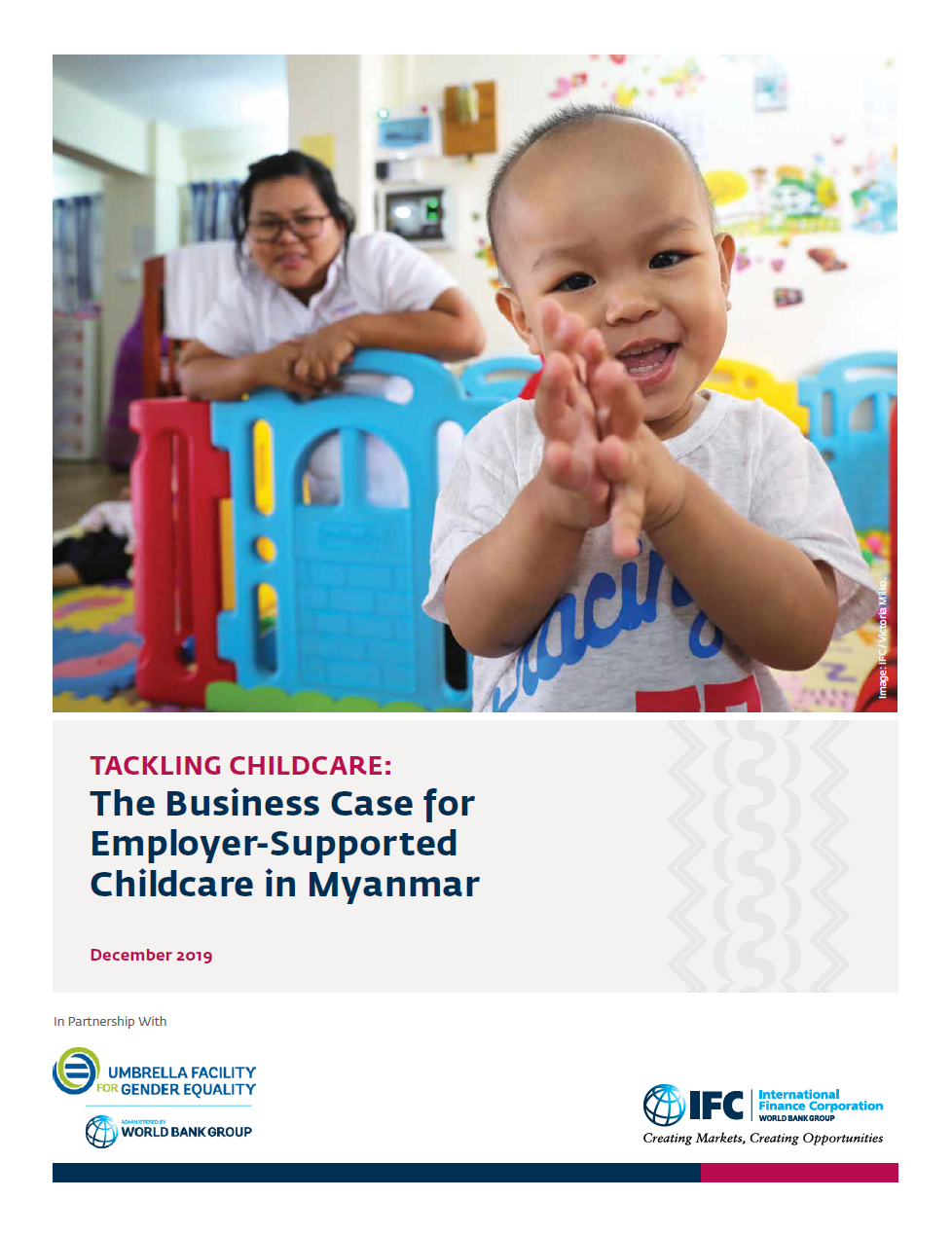
Factive is very pleased to announce the launch of our latest research report for IFC – Tackling Childcare: The Business Case for Employer-Supported Childcare in Myanmar. Several members of our team were present for the official launch in Yangon, Myanmar.
The report findings are intended to provide recommendations for Myanmar businesses on how to better support the needs of working parents and to realize the business benefits of employer-supported childcare.
The research involved almost 800 employee surveys, 45 focus group discussions and 37 key informant interviews. We would like to thank our national consultants Thiri, Moh-Moh and Zu Zu for their epic data-collection efforts!
The report and factsheet are available to download in both English and Myanmar language from the IFC website.

From left to right: Amy Luinstra (IFC), Zun ZuZu Han (Factive), Moh-Moh Aung (Factive), Thiri-San (Factive), Dean Laplonge (Factive), Ellen Maynes (IFC), Hnin Nwe Nwe Aung (IFC).
IFC recruiting for GBV consultant for research in Papua New Guinea
International Finance Corporation (IFC) is seeking a researcher/M&E specialist to evaluate the impact of workplace responses to family and sexual violence (FSV) in PNG from FY20-22. FSV disproportionately affects women and is a key contributing factor to the wide and slow-to-close gender gaps in the Pacific region. The data and analysis derived from this project are expected to increase the number of private sector firms in PNG taking proactive steps to support staff impacted by FSV.
The objective of this assignment is to provide M&E support to IFC on measuring the business case for workplace responses to FSV in PNG. The terms of reference for this role can be downloaded from the following link:
Gender Research Assistant Position
Factive is seeking to employ a casual Gender Research Assistant. This is a consultant position. Key tasks will include:
- Conducting literature reviews to inform research methodologies and to provide background information for reports.
- Writing succinct summaries that show ability to understand, analyse and progress existing literature on gender issues, especially gender-based violence in fragile and post-conflict states.
- Editing reports and other documents.
Applications are accepted from suitable candidates located anywhere in the world. The deadline for applications is 15 August 2019. More details including the application process are included in the document below:
Stories of successful women in Myanmar’s garment industry.
We have all seen headlines about the poor working conditions in Myanmar garment factories. While these headlines are certainly grounded in truth, the reality is that for many women in Myanmar, the garment industry is one of the few professions where they can earn enough money to cover their daily living expenses. And for some women, the garment industry has provided the basis for a successful and rewarding career.
Five of those women were the focus of a recent ILO project to highlight the stories of some of the garment industry’s female success stories. We were thrilled to work with the ILO on this project and to meet the inspiring women who kindly contributed their stories and their time. The profiles were written during a series of interviews in the women’s homes and places of work in and around Yangon, Myanmar.
These profiles are meant to inspire the new generations of women coming to play an active role in the world of work, providing examples of how these female leaders cope with life in and beyond the workplace. The profiles include a number of powerful and inspiring women who already hold prominent roles in the Myanmar’s garment industry, be they factory-level operators, supervisors, heads of enterprises, and directors of trade unions or employers’ organizations.
Ms Catherine Vaillancourt-Laflamme, Chief Technical Advisor / Project Manager, ILO Liason Office in Myanmar.
We would like to thank Catherine from the ILO Liason Office in Myanmar for the opportunity to work on this creative and inspiring project, and thanks also to our National Consultants Moh-Moh and Thiri-San who arranged and conducted the interviews.
The profiles can be downloaded directly from the ILO’s website at this link.
Gender smart safety in Papua New Guinea

An innovative partnership between International Finance Corporation (IFC), St Barbara and the Business Coalition for Women (BCFW) in Papua New Guinea has helped to build a safer workplace for female employees working at the Simberi gold mine. The implementation of a “Gender-Smart Safety” program in 2016 resulted in an 18 percent increase in the percentage of women who feel happy about their safety at work.
You might be wondering what it is that makes a safety program “Gender-Smart?” The program involved training a cross-functional team of employees from human resources, safety and housekeeping on how to conduct safety audits to identify risks and hazards faced by women in the workplace. Factive played a key role in researching and developing the Gender-Smart Safety initiative.
This trained team at the Simberi gold mine was able to identify risks specific to female employees that had not been identified using business-as-usual safety practices. By identifying these risks, the team was able to put mitigation strategies in place and monitor their safety performance against a set of key performance indicators.
For more information on IFC’s work on gender in East Asia and the Pacific visit their website here. A summary of the Gender-Smart Safety program (pictured) and how it is helping to create safer workplaces for women at St Barbara’s gold mining site in PNG can be downloaded via this link.
Workplaces free from bullying and sexual harassment are good for business
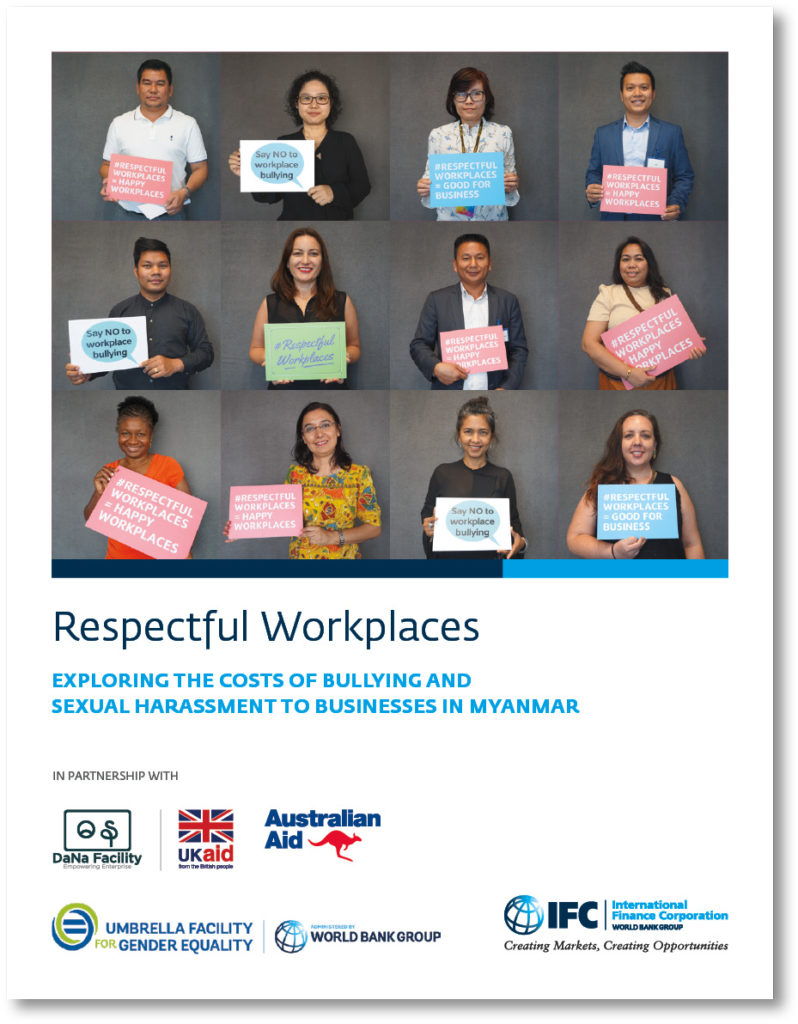
Factive is pleased to announce the official launch of the report: Respectful Workplaces: Exploring the Costs of Bullying and Sexual Harassment to Businesses in Myanmar.
The study was carried out by the Factive team in Myanmar on behalf of International Finance Corporation (of the World Bank Group) and DaNa Facility between September and November in 2018 to understand the experiences of employees relating to bullying and sexual harassment in Myanmar workplaces. There were 39 participating organisations, including 26 large businesses in the agribusiness, finance, retail and tourism sectors.
Some of the key findings of the report:
- Sexual harassment affects all workplaces. 21 percent of employees said they had witnessed an incident of sexual harassment in their current workplace.
- Bullying is more common than sexual harassment. More than half of the employees said they had witnessed an incident of bullying.
- Bullying and sexual harassment are a significant cost to business. On average, the study found businesses experience a 14% loss to labor productivity due to presenteeism caused by bullying and sexual harassment.
- Businesses are not adequately prepared to respond. Very few businesses had formal policies and procedures in place. The vast majority of employees do not report incidents of sexual harassment and bullying. Instead, they ignore them or discuss them on social media.
- Bullying and sexual harassment are workplace culture issues that can be addressed. There were considerable differences in the levels of bullying and sexual harassment across the 26 large businesses. This contradicts the common excuse that these disrespectful behaviors are a natural part of Myanmar culture.
The report offers business leaders in Myanmar an opportunity to understand the experiences of employees relating to bullying and sexual harassment in their workplaces. It also provides a set of practical recommendations, targeting business leaders, human resource managers, employees and other interested parties, to help create workplaces that are safe and free from bullying and sexual harassment.
The report was produced by IFC’s Gender Secretariat in partnership with DaNa Facility. You can download a free copy of the report by visiting IFC’s website. Both Burmese and English versions are available.
What role for business in addressing gender-based violence?

Live panel: Thursday 28 March, 15:00-16:00 GMT / 11:00-12.00 EDT
Save this date to join us for a live panel discussion on what role business can play in addressing issues around gender based violence. A panel of experts from a range of sectors and global regions will be participating to share their insights and experience. The panel will include:
- Chiara Condi, President and Founder, Led by HER
- Katja Freiwald, Global Director Global Partnerships, Unilever
- Shabnam Hameed, Operations Officer, Gender, IFC
- Laura Hawkesford, Head of Private Sector Engagement, CARE International
- Dean Laplonge, International Lead Researcher, Gender, IFC & Director, Factive Consulting
- Neta Meidav, Co-Founder & CEO, The Vault
The topics up for discussion will include:
- Why is gender-based violence an important topic businesses should be thinking about?
- What are the best examples of business approaches and interventions to prevent and respond to gender-based violence?
- How can businesses and other organisations collaborate to address gender-based violence in workplaces and communities?
The panel discussion will be hosted and moderated by Business Fights Poverty. For further information and instructions on how to participate, please browse to their forum page.
Weaving Gender with the ILO in Myanmar

Factive’s principal consultant, Dean Laplonge, yesterday presented a summary of his research results at the official launch of the report Weaving Gender.
This report provides detailed information on the results of a gender-equality assessment carried out in 16 Yangon-based factories in Myanmar’s garment sector.
Weaving Gender is the result of many months of meticulous research and stakeholders forums where the preliminary findings of the gender assessment were discussed. The ILO Improving labour relations for decent work and sustainable development in the Myanmar garment industry (ILO-GIP), which receives funding support from the Swedish international development agency (Sida) and H&M, is pleased to share a picture of the industry which, despite the challenges, is encouraging. We invite all the industry stakeholders to join hands in the spirit of social dialogue to ensure that workers in the industry, especially women, can enjoy decent work.
You can download a copy of the English version of the report using the link below. The Myanmar language version will be available soon.
